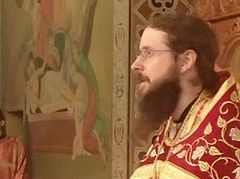We hear in Acts how they opponents of the Gospel in trying to destroy the Church actually aided in spreading the Good News beyond Judaism to the wider pagan world. It’s worth reflecting for a moment on the fact that the openness of the Church to the Gentiles was not, humanly speaking, something initiated by the Apostle. It was rather the consequence of persecution. The Apostles were in effect put in the position that brought about the conversion of pagans. What man “meant for evil; … God meant for good” (Genesis 50:20, NKJV). In this case, God used the sinful intentions of one group to bring about the liberation from bondage to sin and death (see Romans 6:16) of another. Painful though it was, the persecution of the Church was providential. As Tertullian wrote, “the blood of martyrs is the seed of the Church” (Apologeticus, 50).
All of this suggests something that we already know at least theoretically. God in His great love for us can, and does, bring good out of evil. By His grace “all things work together for good to those who love God, to those who are the called according to His purpose” (Romans 8:28, NKJV).
And yet, in the moment, it can be incredibly hard to remember all of this. As much as I want to abandon myself to the divine providence, to trust in God and His great love and mercy for me, the suffering of the present moment seems to defeat me. I might not curse God but I often do wonder why His plan seems to require my pain.
Reflecting on the events in Acts that we just heard, St John Chrysostom tells us “Look! Not even in tribulation did they succumb to lamentations and tears, as we do, but dedicated themselves to a great and good work and preached the Word even more undaunted.” He goes on to say, “trusting in the grace of God, they applied themselves to the work of teaching” the Gentiles about the mysteries of God and His great love for all mankind (“Homilies on Acts,” 25 in ACCS NT vol V: Acts, 147).
The difference between our age and the apostolic age or our age and Chrysostom’s age is that we, unlike our ancestors, tend to equate faith with internal emotional or intellectual experiences. We think faith is about thinking certain thoughts or having certain feelings. But as Chrysostom’s words make clear, for those first Christians, faith was something that was done; it was an action not just a thought or a feeling.
Our over-emphasis on the psychological dimension of the faith comes at the good works that we are called to do. It is this emphasis on internal, psychological experience that makes us especially prone to doubt and despair.
How often have we heard someone say, how often have we experienced, doubt melting away at Liturgy? Or think about what happens when we are caring for someone. In those moments of active love and sacrifice, even the strongest doubts are revealed to be a tissue of lies.
My trust in God and His providential care for me wavers not when I suffer but when I fail to act and instead allow myself to be swept away by my own, internal monologue. My own thoughts and feelings—my running internal monologue—are the enemies of faith. And the cure? It’s what the holy apostle James tells us in his epistle: “faith without works is dead” (see James 2:14-26). We must do good works, we must keep the commandments.
Understanding the close connection between work and faith can help us make sense of what seem to the surprising conversion of the woman at the well.
Here’s this woman going about her business doing one of the myriad tasks that make up her day. Off she goes, like she has every other day, to fetch water from the well. And what happens when she gets there? She meets Jesus and with just a simple request—”Give me a drink”—the woman’s whole world is transformed. Jesus does steps in and disrupts the Samaritan woman’s expectations not only for her day but also about the relationship between her people and the Jews. “‘How is it that you, a Jew, ask a drink of me, a woman of Samaria?’ For Jews have no dealings with Samaritans.”
In that one moment, everything looks different. And in that one moment, she realizes that she can be different as well.
As often happens in the Gospel, the change comes rapidly. What began as a less than friendly challenge to this Jew becomes a curiosity about this Man Who is claiming to be “greater than our father Jacob.”
Jesus then goes on to demonstrate the sincerity of His offer to give the woman “living water.” And He proves to her that, yes, in fact, He is greater than Jacob. How does He do this?
He reveals the woman to herself. Yes, she knows that she has had five husbands and that the one she is with now is not her husband. And no doubt everyone in the village knew this about her. Unlike neighbors, and likely even herself, Jesus doesn’t respond to the woman situation by condemning her; with Him she feels no need to be ashamed. He knows all this about her, and she knows He knows all this about her, and yet still He offers her “living water.”
What is this living water and why does it matter so?
St Cyril of Alexandria says that in making this offer, Jesus is offering “the quickening gift of the Spirit” that can restore the woman to her “pristine beauty.” Jesus has offered to make this woman, disfigured by her own sins and the sins of others, “beautiful” (Commentary on the Gospel of John, 2.4 in ACCS NT vol IVa: John 1-10, 150).
Jesus is offering to renew her by restoring her to a beauty she never knew was her!
And she says “Yes!”
Not only does she say yes, she leaves behind her old life—the water jar—so that she is free to invite others, those who have shamed and rejected her, to themselves be renewed and made beautiful.
To do this, she has to lay aside what she assumes is the work she is meant to do.It’s only then that she can do the great and good work of following Jesus and inviting others to do so with her.
My brothers and sisters in Christ, there are many reasons why we all become weak in our faith. Let me suggest that one reason is because we fail to do the work God asks of us. Maybe we fail because we’re tired. Maybe because we’re discouraged.
Or maybe, and this I think is the single most common reason, we fail because we don’t know what it is that God has called us to do. As we come now to the final weeks before Holy Pentecost, let us beseech God for ourselves, each other, and the whole Church, that He will reveal to us—as He did the Apostles and the Samaritan woman—the work He has called us to do.
Christ is Risen!




